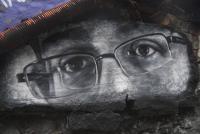-
Trump calls for profiling of Muslims, surveillance of mosques
Providing more details about his response to the Orlando shooting, Donald Trump on Sunday proposed the profiling of Muslims by law enforcement, and the nation-wide implementing of a Muslim surveillance programs which was used for a while by the NYPD, but which was discontinued after it had failed to yield a single useful lead.
-
-
Tracking, analyzing how ISIS recruits through social media

A team of researchers has developed a model to identify behavioral patterns among serious online groups of ISIS supporters that could provide cyber police and other anti-terror watchdogs a roadmap to their activity and indicators when conditions are ripe for the onset of real-world attacks. The researchers apply the laws of physics to study how terrorist support groups grow online, and how law enforcement can track activities.
-
-
Snowden performed “public service” but should be punished: Eric Holder

Eric Holder, the former U.S. Attorney General, has said Edward Snowden performed a “public service” by triggering a debate over surveillance techniques. Holder added, however, that he believed Snowden should be punished for leaking classified intelligence information which threatened U.S. national security.
-
-
Telephone metadata can reveal surprisingly sensitive personal information
Most people might not give telephone metadata – the numbers you dial, the length of your calls – a second thought. Some government officials probably view it as similarly trivial, which is why this information can be obtained without a warrant. Researchers show, however, that telephone metadata – information about calls and text messages, such as time and length – can alone reveal a surprising amount of personal detail. The work could help inform future policies for government surveillance and consumer data privacy.
-
-
Harnessing thousands of network cameras for public safety
Researchers have developed a prototype system that could allow law enforcement and public safety agencies to tap into thousands of cameras located in numerous venues including parking garages, college campuses, national parks and highways. In addition to applications in law enforcement, the system can be used to quickly find damage, plan rescues, and other operations during natural disasters.
-
-
German domestic intelligence needs more powers to combat terrorism: Intelligence chief
Hans-Georg Maassen, Germany’s director of domestic intelligence, said his intelligence agency should be given more resources to fight threats from militant Islamists and right-wing extremists. He was speaking in a symposium on the growing threat of terror attacks in Germany. He said the political climate in Germany was “a lot rougher” than it used to be, as former non-voters and disaffected supporters of the established parties become radicalized against the backdrop of the refugee crisis.
-
-
EU should establish U.S.-style intelligence agency: EU president
The terrorist attacks in Paris and Brussels, just as the earlier ones in Madrid (2004) and London (2005), were a reminder that central pillars of the EU, such as the “area of freedom, security, and justice,” are being challenged. Jean-Claude Juncker, president of the European Commission — the executive branch of the European Union (EU) – said that the EU member states’ mindsets and willingness to cooperate – crucial ingredients in the fight against terror – have not lived up to the challenge. The enduring lack of coordination between security services, police, and judicial authorities, at the national and the European levels, needs to be urgently tackled to reduce Europe’s vulnerability to such risks. To address and resolve these problems, and bolster European security in the face of terrorism, Juncker has proposed a European “Security Union.”
-
-
Snowden revelations led to “chilling effect” on pursuit of knowledge: Study
National Security Agency (NSA) whistleblower Edward Snowden’s 2013 mass surveillance revelations caused a drop in website browsing, particularly in internet searches for terms associated with extremism, an example of the most direct evidence yet that the spying operations exposed in the leak had a “chilling effect” on the lawful pursuit of information, an impending report has found.
-
-
Privacy advocacy groups ask NSA to halt changes to data sharing rules
More than thirty organizations sent a letter to the Director of National Intelligence and the Director of the National Security Agency, urging them to halt reported changes to the rules governing when and how the NSA can share the data it collects through overseas surveillance.
-
-
Four questions Belgians should ask about the Patriot Act

The Paris and Brussels terrorist attacks added a sense of urgency to calls for Belgium to enact its own counterterrorism bill. It is a call the French government has already answered. Increased use of surveillance is a worldwide trend. There is no guarantee, however, that even with the most sophisticated surveillance technology out there today, passing a bill or law to collect private information on citizens will protect us from terrorist threats and violence. Even more vexing: the nature of intelligence gathering means we may never know exactly how many attacks have been prevented by the Patriot Act, the French surveillance law — or a similar law that Belgium may soon pass.
-
-
FBI may be able to break into San Bernardino terrorist’s phone without Apple’s help

Magistrate Judge Sheri Pym has postponed until 5 April a court hearing about the FBI’s request that the court would order Apple to unlock the phone of one of the San Bernardino terrorists. The FBI asked the judge to postpone the hearing after the agency said it may have found a way to unlock the phone without Apple’s help.
-
-
Apple versus FBI: All Writs Act’s age should not bar its use
A federal magistrate judge in California has issued a warrant ordering Apple to assist the FBI in accessing data on an iPhone used by a suspect in the December 2015 San Bernardino mass shooting. Apple’s public refusal to comply with the order – and its motion asking a judge to reverse the order – have set up a legal showdown that has captivated the technology world. It’s hard not to think that marketing and economics are at least somewhat behind Apple’s actions. But my guess is most people understand that the FBI would not be getting into their phones without a probable cause search warrant. In addition, I would think Apple would not want to have a market composed of people who want to use iPhones for dangerous and illegal activity. The company might actually lose more future customers because of its uncooperative attitude than it would ever lose by helping the government by complying with a court order.
-
-
In FBI versus Apple, government strengthened tech’s hand on privacy
The ongoing fight between Apple and the FBI over breaking into the iPhone maker’s encryption system to access a person’s data is becoming an increasingly challenging legal issue. This case is very specific, and in this narrow case, Apple and law enforcement agencies will likely find a compromise. However, this question is not going away anywhere. With the “Internet of things” touted as the next big revolution, more and more devices will capture our very personal data – including our conversations. This case could be a precedent-setting event that can reshape how our data are stored and managed in the future.
-
-
Refined interview technique can reveal terror plots
An interview technique for eliciting intelligence without asking questions has in a series of experiments proven to work very well. The idea dates back to the renowned Second World War interrogator Hanns Scharff, but has now, for the first time, been empirically validated. The technique can help intelligence agencies reveal plans of future terrorist acts.
-
-
More Americans support Justice Dept. than Apple in locked iPhone dispute
As the standoff between the Department of Justice and Apple Inc. continues over an iPhone used by one of the suspects in the San Bernardino terrorist attacks, 51 percent say Apple should unlock the iPhone to assist the ongoing FBI investigation. Fewer Americans (38 percent) say Apple should not unlock the phone to ensure the security of its other users’ information; 11 percent do not offer an opinion on the question.
-
More headlines
The long view
How DHS Laid the Groundwork for More Intelligence Abuse
I&A, the lead intelligence unit of the Department of Homeland Security (DHS) —long plagued by politicized targeting, permissive rules, and a toxic culture —has undergone a transformation over the last two years. Spencer Reynolds writes that this effort falls short. “Ultimately, Congress must rein in I&A,” he adds.
